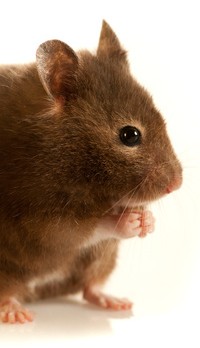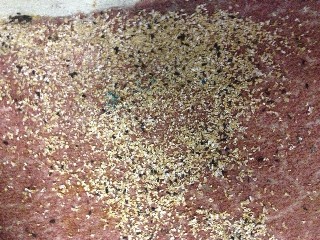Mice Pest Control & Advice
Predator Pest Solutions are specialists in treating mice infestations. If you would like a free no obligation quote, please call us on 0800 112 3480 or fill in the form on the right.
Information On Mice
Mice are one of the most common pests in the home, as they are well adapted to living around humans. In fact they thrive in these conditions, and also live in outbuildings, garages and garden sheds where there is shelter from cold and wet weather conditions.
 The two main species of mouse found in homes are the house mouse, which is usually uniformly grey in colour, and the wood mouse, which has an orange-brown back and white under parts, with a clear dividing line between the two. The wood mouse is predominantly found in hedgerows, banks and woods, but they can also enter buildings (especially in rural areas) during the autumn months.
The two main species of mouse found in homes are the house mouse, which is usually uniformly grey in colour, and the wood mouse, which has an orange-brown back and white under parts, with a clear dividing line between the two. The wood mouse is predominantly found in hedgerows, banks and woods, but they can also enter buildings (especially in rural areas) during the autumn months.
Mice have good hearing, but poor eyesight and, although they prefer cereal based foods, will eat almost anything, preferring to feed from a number of different sources, rather than from a single location. They are very inquisitive animals and like to have a good knowledge of the area they live in. They are most active at night, but you may also see activity during the day.
Mice Infestation & Risks
It is important to actively control any mice infestation, as they will breed incessantly throughout the year and multiply in number very quickly. In restaurants or other food premises, contamination of food for human consumption will result in a failure to comply with the hygiene requirements as set out in the food safety (General Food Hygiene) Regulations 2004 and other legislation.
Mice can live in almost any available space, crawling through the smallest holes or cracks, living and breeding under floors, in cavity walls, ceiling voids and behind skirting boards, preferably close to food and water sources. They live in one location, but can easily move between properties, as they are extremely good climbers, using walls, pipes, cavities and ducting to access other areas. They have very hard incisor teeth, which can result in expensive damage to your property, if they chew through electrical wiring, which can create an increased risk of fire or electrocution.

To locate a mouse nest, try to identify the source of any scratching noises, or trace any smears to walls or skirting boards (caused by the mice continually rubbing their fur along these surfaces) to any access holes, burrows or cracks. You may also be able to trace them by their distinctive musky smell, which is particularly noticeable when you first enter a property. Once located, the nest will look like balls of material that have been loosely woven together.
Mice will quickly contaminate the environment they live in with their urine, droppings and hairs. They can carry a number of infectious diseases, which can be passed to humans and animals, normally by the contamination of food or surfaces by their urine, droppings and/or hairs. One of the most serious diseases is ‘Leptospirosis’, which can lead to ‘Wells Disease’ and can be deadly to humans.
Mice Pest Control
If you have a mouse infestation there are numerous over the counter poisons and a variety of traps you can buy. If you choose to use these, then always follow the manufacturer’s instructions. However, in our experience these options can be ineffective and due to the time wasted, result in the infestation increasing in size, more damage to your property, and be an additional cost to getting the infestation under control and eradicated.
Treatment is normally by the use of HSE approved Rodenticide baits, gels and/or traps, applied to bait stations in and around the affected areas.
In most situations it takes up to 60 minutes for our technician to complete their risk assessment, the required treatment and to brief the customer on the actions taken and next steps, but this can be extended if the infestation is in numerous areas or other hazardous conditions exist.
Once completed the mouse activity should start to reduce after a few days, but our technician will return after 7-14 days to confirm this and complete any required proofing. Some mice infestations, especially those in commercial or multi-occupancy buildings may require additional visits to control or eradicate all activity.
If you have a mouse infestation:
- Check air bricks and ventilation grills are in place and intact, but do not block them.
- Check drain covers and grills are in place and intact.
- Block any access points around gas, electricity, water, heating and extraction pipe work.
- Check all external doors fit tightly in their frame.
- Restrict food sources by storing food within rigid containers.
- Sweep up food spillages immediately and don’t leave uncovered food lying around.
- Regularly clean under kitchen units, appliances and in any other areas where food debris and grease can build.
- Regularly remove rubbish and place in strong bags within a secure external bin.
- Keep your garden and any outbuilding’s free from debris and food waste.
- Store pet food sensibly and securely.
- Do not compost meat, fish, bones or bread.
- Avoid overfeeding wild birds or animals and regularly clear up any uneaten food.
- Call Predator Pest Solutions on Freephone 0800 112 3480.
On arrival, our technician will:
- Establish the location and size of the mouse infestation.
- Identify their harbourages, routes being used and food sources.
- Determine the most appropriate method for access and treatment.
- Brief the customer on their findings and recommend next steps.
- Ensure the safety of others & protect any food preparation areas.
- Wear their protective equipment and commence with the treatment.
- Determine the correct and optimum locations for any baits or traps and deploy these with minimum impact to the customer.
- Complete any requested proofing of the property.
- If required, implement a regular monitoring regime and maintain a site plan of the bait or trap locations.
- Ensure the area is left safe and provide a written report.














